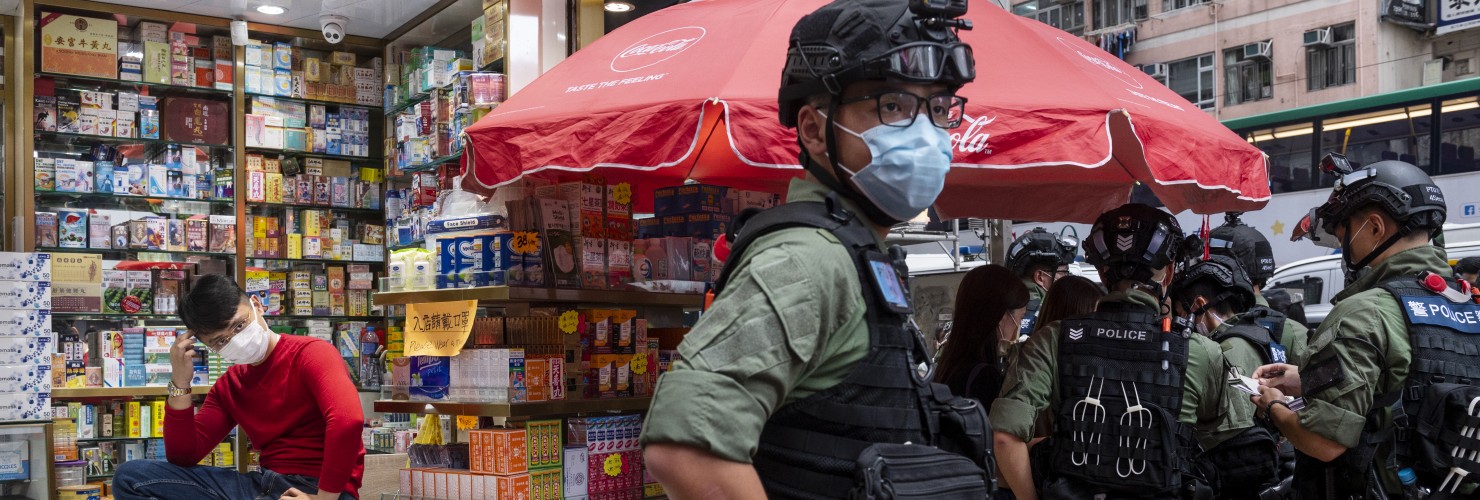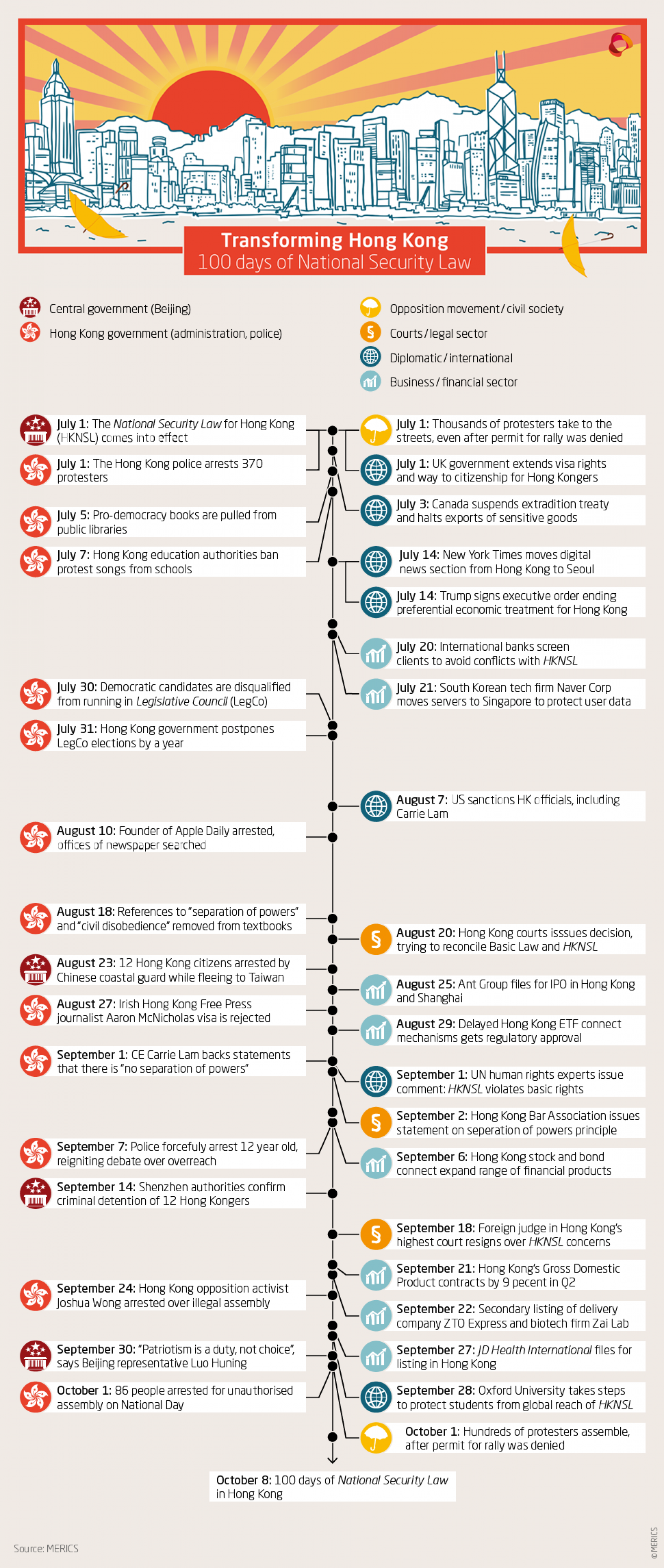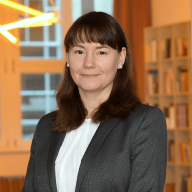

Transforming Hong Kong, one day at a time
October 8 marked 100 days since the introduction of the National Security Law for Hong Kong (HKNSL). UN human rights experts have issued a detailed critique of the law and its incompatibility with the human rights standards and treaties that Hong Kong is a party to. State leaders across Europe have called for its abolition. But this – or even a substantial revision of the law – is out of the question for China’s government.
In Beijing’s eyes, the introduction of the much-contested law has been a complete success. It is hailing the law’s efficiency in reestablishing public order in the special administrative region. And indeed, with a little help from pandemic-related restrictions on public assembly, the frequent and, at times, violent pro-democracy protests of the previous year have abated. Those who openly called for independence have fallen silent. Both the Central and Hongkong government argue that the law has ultimately provided a boost for good governance in the city. They still hold that the law only targets an “extremely small minority” of violent offenders – after all, less than 30 people have been arrested so far for violating the HKNSL.
However, it was clear from the start that, by design, the law can be used to target a wide range of opposition and resistance to the party-state’s encroachments on Hong Kong’s liberties. So it comes as no surprise that Beijing’s downplaying of the impact does not reflect the reality on the ground. While the law has only been directly applied in a limited number of individual cases, the indirect effects of both its vaguely worded stipulations and accompanying measures taken by the Hong Kong administration have been severe. Across the board, the chilling effect on criticism, academic debates, civil rights advocacy, and international engagement is already clearly visible.
No more separation of power and civil disobedience
Both Chief Executive Carrie Lam and mainland officials have made clear that separation of powers has no place in Hong Kong, as it cannot be reconciled with the executive-led governing system. This speaks to a climate where fundamental principles of rule of law and judicial independence are under threat. Courts are struggling to reconcile the HKNSL with the protection of civil and political rights granted to Hongkongers through the Basic Law and international treaties. Indeed, one of the foreign judges, wo serve at the invitation of the city and provide an additional safeguard for judicial independence, has already resigned with reference to the law.
After the victory of the pro-democratic camp in Hong Kong’s local elections late last year, a number of steps seem to take aim at ensuring they will not succeed in the next LegCo election, which has been postponed for a year. A number of pro-democracy candidates have already been excluded; more will likely follow as “objection in principle” to the HKNSL has been made a basis for exclusion.
Restriction of freedom of press and opinion
The education system is being brought into line as well. Libraries have removed books by pro-democracy activists, and references to separation of power and civil disobedience have been deleted from schoolbooks. The first teacher was deregistered, and barred from his job for life, for discussing pro-independence positions in the classroom. His superiors were sanctioned too, sending a clear signal to all administrators.
Independent media coverage has also been curtailed by measures such as the Hong Kong police restricting access for certain media outlets. International journalists attempting to join critical media organizations have been denied visas. Civil society, too, is heavily affected, especially those engaged in advocacy. Civil society organizations are rethinking their ties with international actors, and the German Naumann Foundation has closed its office due to security concerns for its staff.
Dim prospects
The relative tranquility on the surface should not be taken as a sign of support for the new law, as further conflict may be fomenting beneath. Despite risks posed by the HKNSL, there has been substantial and sustained pushback over the past months. People have still come out to protest, civil society organizations and professional organizations from the education, media and legal sectors have issued multiple statements pointing out issues and challenging the measures outlined above.
This has been well noted by the party leadership. On Chinese National Day, Luo Huining, Beijing’s chief representative in the city, reminded Hongkongers, that “patriotism is not a choice, but a duty”. In the Chinese leadership’s definition, loving the country is inseparable from loving the Chinese Communist Party and supporting its hold on power. He called for students and civil servants to be the first to receive patriotic education. But hopes that the government can remold people’s minds and instill patriotic fervor in Hong Kongers with education alone are unrealistic. Identification as a Chinese has fallen to a low point over the past decade, especially in younger demographics. – Beijing’s increasingly authoritarian approach has broadened the divide for young Hongkongers brought up in a liberal environment. It is a gap that will be hard to bridge.
Beijing is keenly aware of potential sources of resistance and is far from trusting that the HKNSL alone is sufficient for maintaining order. For, in its eyes, Hong Kong is another source of potential trouble at China’s periphery, just like Xinjiang, Tibet and now again Inner Mongolia. Emboldened by its success in introducing the law top-down, it has an appetite for more. Work on “complimentary” laws to support the implementation of national security has already begun.
Prospects remain dim for Hongkongers that long for a greater degree of political freedom. Governments, academics, and civil society organizations accross the world need to maintain monitoring of both the attempts to protect existing freedoms and further restrictions thereon. They need to let Beijing know they are still watching closely – and willing to act on what they see.


